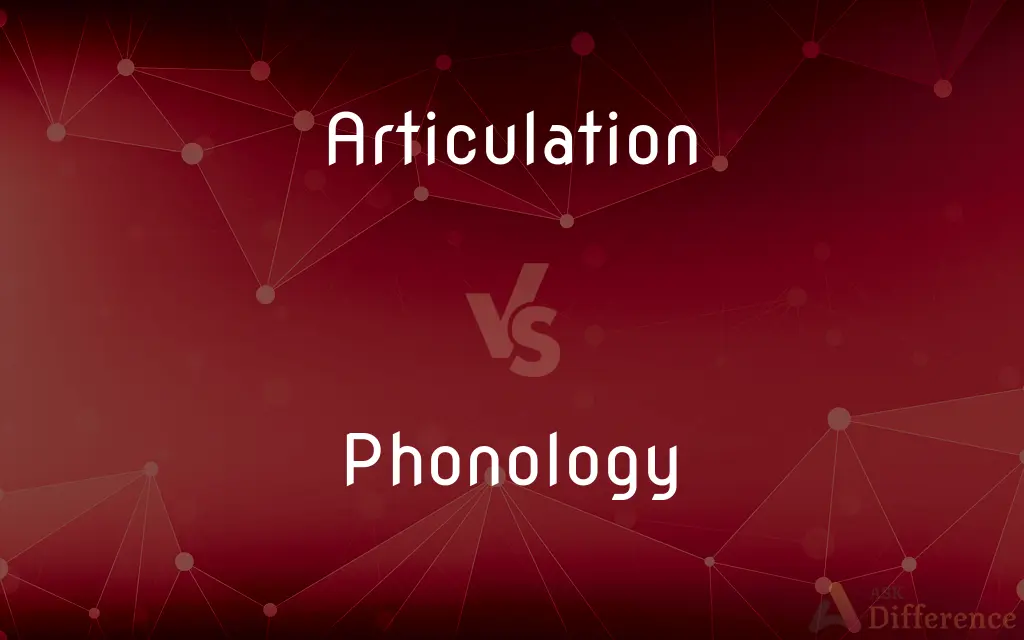Articulation vs. Phonology — What's the Difference?
By Tayyaba Rehman — Published on January 17, 2024
Articulation is the physical production of speech sounds, while phonology is the study of sound patterns and their meanings in a language.

Difference Between Articulation and Phonology
Table of Contents
ADVERTISEMENT
Key Differences
Articulation refers to the physical process of producing specific speech sounds using the tongue, lips, palate, and vocal cords. It's about how sounds are formed. Phonology, in contrast, deals with the abstract, systemic nature of sounds in a specific language and how those sounds convey meaning.
In articulation, the focus is on the mechanics of speech production, such as how the placement of the tongue affects the sound produced. Phonology, however, looks at how sounds function within a language, including rules governing sound combinations and the phonetic variations of sounds.
Articulation is about the physical execution and precision in speech sound production, which is crucial in speech clarity and intelligibility. Phonology encompasses a broader scope, studying the organization of sounds and the rules that govern their behavior in different linguistic contexts.
Speech therapists often work on articulation to correct speech sound disorders. In contrast, phonologists analyze the structure and function of sound systems in languages, studying aspects like phonemes, stress, and intonation patterns.
In summary, while articulation is a physical and motor skill related to producing speech sounds, phonology is a theoretical and abstract aspect of linguistics that studies how those sounds are organized and used in languages.
ADVERTISEMENT
Comparison Chart
Focus
Physical production of speech sounds
Study of sound patterns and their meanings
Scope
Mechanics of speech sound production
Organization and behavior of sound systems
Application
Speech clarity and sound disorders
Linguistic analysis and theory
Professional Involvement
Speech therapists, vocal coaches
Linguists, phonologists
Relation to Language
Concerned with individual sounds
Concerned with sound systems in context
Compare with Definitions
Articulation
The act of producing clear and distinct sounds in speech.
Her excellent articulation made her an effective public speaker.
Phonology
The branch of linguistics concerned with the organization of sounds.
In phonology, a phoneme is the smallest unit of sound that can change meaning.
Articulation
The movement of speech organs to produce sounds.
Articulation disorders can affect the clarity of speech.
Phonology
The theoretical aspect of sounds in language.
Her research in phonology focuses on sound changes in dialects.
Articulation
The enunciation of speech sounds.
Piano teachers often stress the importance of articulation in playing.
Phonology
The analysis of how sounds function within a particular language.
English phonology includes the study of stress and intonation patterns.
Articulation
The act of vocal expression; utterance or enunciation
An articulation of the group's sentiments.
Phonology
The study of sound systems and patterns in language.
Phonology examines how sounds contrast to convey meaning.
Articulation
The act or manner of producing a speech sound.
Phonology
The aspect of linguistics that investigates sound systems and their rules.
Phonology helps in understanding the structure of different languages.
Articulation
A speech sound, especially a consonant.
Phonology
The study of speech sounds in language or a language with reference to their distribution and patterning and to tacit rules governing pronunciation.
Articulation
A jointing together or being jointed together.
Phonology
The sound system of a language
The phonology of English.
Articulation
The method or manner of jointing.
Phonology
The study of the way sounds function in languages, including phonemes, syllable structure, stress, accent, intonation, and which sounds are distinctive units within a language.
Articulation
A fixed or movable joint between bones.
Phonology
The way sounds function within a given language; a phonological system.
Articulation
A movable joint between inflexible parts of the body of an animal, as the divisions of an appendage in arthropods.
Phonology
The science or doctrine of the elementary sounds uttered by the human voice in speech, including the various distinctions, modifications, and combinations of tones; phonetics. Also, a treatise on sounds.
Articulation
A joint between two separable parts, as a leaf and a stem.
Phonology
The study of the sound system of a given language and the analysis and classification of its phonemes
Articulation
A node or a space on a stem between two nodes.
Articulation
The conversion of a student's credits at one school to credits at another school by comparing the curricula.
Articulation
A joint or the collection of joints at which something is articulated, or hinged, for bending.
The articulation allowed the robot to move around corners.
Articulation
(countable) A manner or method by which elements of a system are connected.
Articulation
(uncountable) The quality, clarity or sharpness of speech.
His volume is reasonable, but his articulation could use work.
Articulation
(linguistics) The manner in which a phoneme is pronounced.
Articulation
The manner in which something is articulated (tongued, slurred or bowed).
The articulation in this piece is tricky because it alternates between legato and staccato.
Articulation
(accounting) The interrelation and congruence of the flow of data between financial statements of an entity, especially between the income statement and balance sheet.
Articulation
(education) The induction of a pupil into a new school or college.
Articulation
A joint or juncture between bones in the skeleton.
Articulation
The connection of the parts of a plant by joints, as in pods.
Articulation
The act of putting together with a joint or joints; any meeting of parts in a joint.
Articulation
The state of being jointed; connection of parts.
That definiteness and articulation of imagery.
Articulation
The utterance of the elementary sounds of a language by the appropriate movements of the organs, as in pronunciation; as, a distinct articulation.
Articulation
A sound made by the vocal organs; an articulate utterance or an elementary sound, esp. a consonant.
Articulation
The aspect of pronunciation that involves bringing articulatory organs together so as to shape the sounds of speech
Articulation
The shape or manner in which things come together and a connection is made
Articulation
Expressing in coherent verbal form;
The articulation of my feelings
I gave voice to my feelings
Articulation
(anatomy) the point of connection between two bones or elements of a skeleton (especially if the articulation allows motion)
Articulation
The act of joining things in such a way that motion is possible
Articulation
The physical process of forming speech sounds.
Proper articulation is essential for clear communication.
Articulation
The physical aspect of how speech sounds are made.
Vocal training includes exercises to improve articulation.
Common Curiosities
What does phonology study?
Phonology studies the patterns and functions of sounds within a language.
What is articulation in linguistics?
Articulation in linguistics refers to the physical process of producing speech sounds.
How is articulation important for language learning?
Proper articulation is essential for learning to speak a language correctly and clearly.
Can phonology help with language disorders?
Yes, understanding phonology can assist in diagnosing and treating language disorders.
How is articulation different from phonetics?
Articulation is about producing sounds, while phonetics is the broader study of those sounds, including their acoustic and auditory properties.
Is phonology only about sounds?
Phonology primarily focuses on sounds but also encompasses aspects like stress and intonation patterns.
Are phonology and morphology related?
Yes, phonology and morphology are related; phonology deals with sound structure, while morphology deals with word structure.
Do all languages have the same phonological rules?
No, different languages have unique phonological rules and sound systems.
Are there physical aspects to phonology?
Phonology is more abstract, dealing with how sounds are organized in the mind rather than their physical production.
What is a common focus in articulation therapy?
A common focus in articulation therapy is correcting specific speech sound errors.
Can articulation disorders be corrected?
Yes, articulation disorders can often be corrected with speech therapy.
Is the study of phonology important for linguists?
Yes, phonology is a fundamental area of study for linguists, providing insights into language structure and use.
What role does articulation play in communication?
Articulation plays a crucial role in making speech clear and understandable.
Does phonology change over time?
Yes, phonology can change over time as part of language evolution.
Can a person have good articulation but poor phonological skills?
Yes, it's possible to articulate sounds clearly but have difficulty with the phonological aspects of language, such as using sounds correctly in different contexts.
Share Your Discovery

Previous Comparison
Dorsiflexion vs. Plantar Flexion
Next Comparison
Vitamin D vs. Vitamin D3Author Spotlight
Written by
Tayyaba RehmanTayyaba Rehman is a distinguished writer, currently serving as a primary contributor to askdifference.com. As a researcher in semantics and etymology, Tayyaba's passion for the complexity of languages and their distinctions has found a perfect home on the platform. Tayyaba delves into the intricacies of language, distinguishing between commonly confused words and phrases, thereby providing clarity for readers worldwide.












































